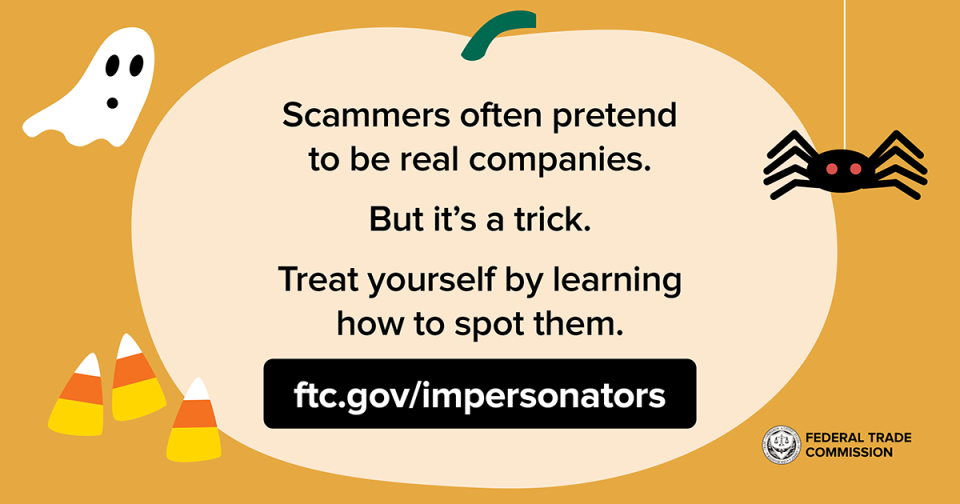Halloween is almost here. What could be scarier than not having your costume ready? How about ordering a costume online and never getting what you paid for? Scammers are making this season extra spooky by pretending to be real companies like Spirit Halloween and Party City. But it’s all a trick. Here’s what to know.
You see an ad on Facebook or Instagram that looks like it’s from a company like Spirit Halloween or Party City, promoting a huge clearance sale for “90% off” last year’s stock. It might look like an incredible deal — but the ad’s a fake placed by scammers. And if you place an order, you’ll end up with a counterfeit item, an item with wear or damage, something completely different than what you ordered…or nothing at all.
So, if you’re shopping online for Halloween costumes, decorations, or party favors, how do you spot the impersonators?
- Know that scammers can make ads look like they’re from a real company by using the same name and logo, even though they’re not actually legit. If you see an ad for a company you know but you’re not sure the ad is real, visit the company’s website using a link you know is official — not the link in the ad.
- See what people are saying online. Search the company’s name online plus the word “scam.” It’s possible someone else has experienced a scammer pretending to be a real company.
- Pay by credit card. If you’re charged for an order you never got, or for a product that's not as advertised, contact your credit card company and dispute the charge.
Learn more about business impersonators at ftc.gov/impersonators. If you suspect a scam seller, tell the FTC at ReportFraud.ftc.gov.


Based on my observations it appears retailers and manufactures often manipulate the price of certain items in such a way that all purchasing options for consumers are at the identical price point across the spectrum of sources. As an example, this frequently occurs in the electronics market. Case in point, yesterday a particular electronic sound system was available from brick & mortar retailers, online sellers and the manufacturer at $849.45, a price less than its list price of $1199.95. Today, 24 hours later, that same system is selling at its list price at all these same retail sources. This price adjustment seems deliberate and well-coordinated. The numbers are identical and the change occurred simultaneously among all sources thereby precluding any competitively-priced offers. Clearly nothing here to imply independent pricing by the sources that might benefit the consumer. To me this suggests price fixing.
In addition to this apparent sham, an added deception suggests that the “lowest price guarantee” claimed by many retailers is nothing but a sales ploy of no value to lure buyers into believing they could obtain a genuinely competitive price for their purchase.
Is not competition one of the building blocks of Capitalism or has price fixing become the norm and therefore acceptable?
Thank you ! This article was very helpful! Happy Halloween!
Ordered item from Facebook claiming Nordstrom product. Bank denied order 5 times due to website bad rankings. Meanwhile, 5 charges from other fake came in 5 min
Order was made to a "clearance warehouse" for spirit of halloween. Tracking number was sent and has been said that item was signed for and received. Never received so called my local Post Office and supposed tracking number does not even exist. Calling my bank tomorrow to see if anything can be done. I have found out they are the king of ghosting, go to their website and they are now referred to as "Ross Dress For Less". Lesson learned
I am trying to report a Best Buy scam. As a Total Tech member (for $179.99/yr.) since 6/17/2023, I was just sent an email stating that my Best Buy credit card account has been charged $499.99 for the annual renewal. I had the option of confirming or cancelling this automatic charge to my account. The instructions in the email told me to call the following number: +1 (833) 743-3838. Of course, I did not call that number because surely the hacker would have asked for my account number. Please do what you can to stop this scam immediately! Thank you.